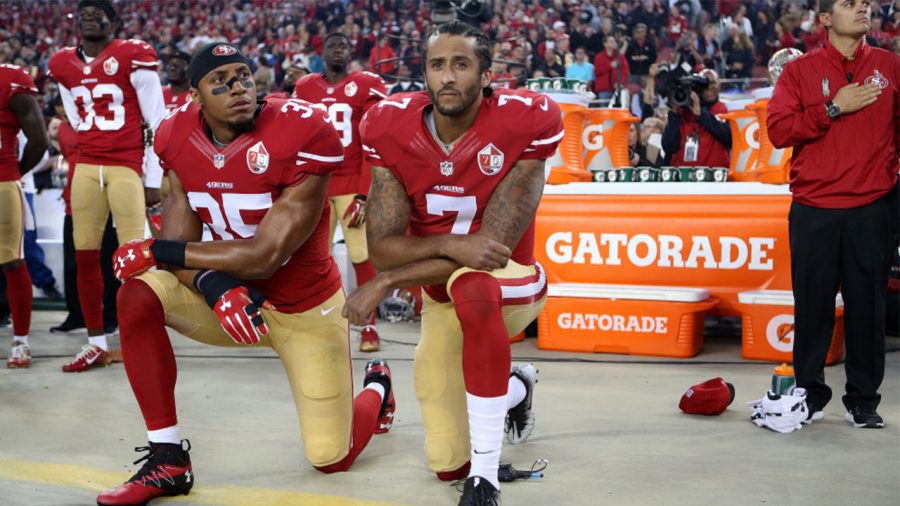Sports and politics shouldn’t mix
San Francisco 49ers quarterback Colin Kaepernick, left, and teammate kneel during the national anthem before an NFL football game.
June 24, 2018
The NFL’s May 23 decision to prohibit kneeling during the national anthem comes on the heels of the divisiveness caused by players protesting oppression of minorities in America, however the rule isn’t unreasonable. The NFL wants to keep football as a recreational pastime; if players want to make political commentary they may do so on their own time.
The practice of kneeling during the anthem as a form of protest began with San Francisco 49ers quarterback Colin Kaepernick before the first preseason game of August 2016. Kaepernick’s protest started gaining attention when Jennifer Lee Chan, a writer for Niners Nation, tweeted a photo of the field during the anthem without addressing the fact that Kaepernick was kneeling. Followers noticed Kaepernick was kneeling and it was later confirmed in a statement from the 49ers.
“I’m going to continue to stand with the people that are being oppressed,” Kaepernick said during a August 2016 interview with NFL.com. “To me, this is something that has to change. When there’s significant change and I feel that the flag represents what it’s supposed to represent, and this country is representing people the way that it’s supposed to, I’ll stand.”
Since then, other players joined Kaepernick, including his teammate Eric Reid, by kneeling during the anthem to protest racial injustice and oppression.
The new rule mandates all players must stand during the playing of the national anthem, or stay in the locker room if they choose, according to a May 23 NFL press release. This new rule seems to stem from the amount of controversy surrounding the act of kneeling during the national anthem. Players that choose to kneel will now receive a penalty for violating NFL code of conduct. NFL Commissioner Roger Goodell stated despite wanting to give the players freedom of choice, the national anthem is a moment that should be respected.
While the act of kneeling has good intentions, players looking to support the rights of oppressed communities should put their efforts into a more productive medium, such as using their platform to shed light on the issues they stand for.
Those who criticize the protest claim it is disrespectful as the anthem represents America’s values, history and culture, and kneeling discredits those values greatly.
New Orleans Saints quarterback Drew Brees has voiced his support for the message behind the kneelings, but disagrees with the method of delivery.
“It’s an oxymoron that you’re sitting down, disrespecting that flag that has given you the freedom to speak out,” Brees said.
The point Brees makes here is valid as protesters’ rights to free speech and right to protest are protected under the First Amendment. It seems rather counterproductive to protest the country that has given you those rights in the first place.
Those who agree with kneeling during the anthem claim it is a form of peaceful protest; the players are protesting racial injustice and police brutality, not the country as a whole. Kaepernick himself expressed he will not “stand up to show pride in a flag for a country that oppresses black people and people of color.”
Kaepernick also stated that he is not, “anti-American. [He] love[s] America.” Both sides certainly have fair points and are logical in their conclusions. Although kneeling during the anthem is a form of peaceful protest, it is misplaced by blaming all of these social injustices on the country as a whole. Kaepernick and others have a reason to protest. However, it is unfair to blame social issues on an entire country and all the history and values we have worked towards thus far. Instead of kneeling during the anthem.







